The best bar in Kazakhstan moves at 60 miles per hour. It’s the third car from the rear on Train 003XA from Almaty to Astana. There, passengers (mostly men) from all over this least Islamic of Islamic countries get together and pound cheap vodka and beer, introducing themselves, laughing, throwing around food, and above all making sure your glass is never empty. I was head-butted by my cabin-mate, but in the friendliest way.
Though it’s 15 degrees Fahrenheit and snowing outside, cramped in the tiny bar car it is almost tropical. People step out into the space between the cars to smoke, piss, and cool down in the wind. It’s a magical experience. One should visit Kazakhstan just to hang out in their bar cars.
Videos by VICE
If only it were like this in the rest of the ex-Soviet empire. For in Russia—vodka-soaked Russia, Russia of Stalin, Catherine, and Ivan the Terrible, Russia of my liquor-soaked dreams—a calamity has taken place. Vodka is banned on the trains.
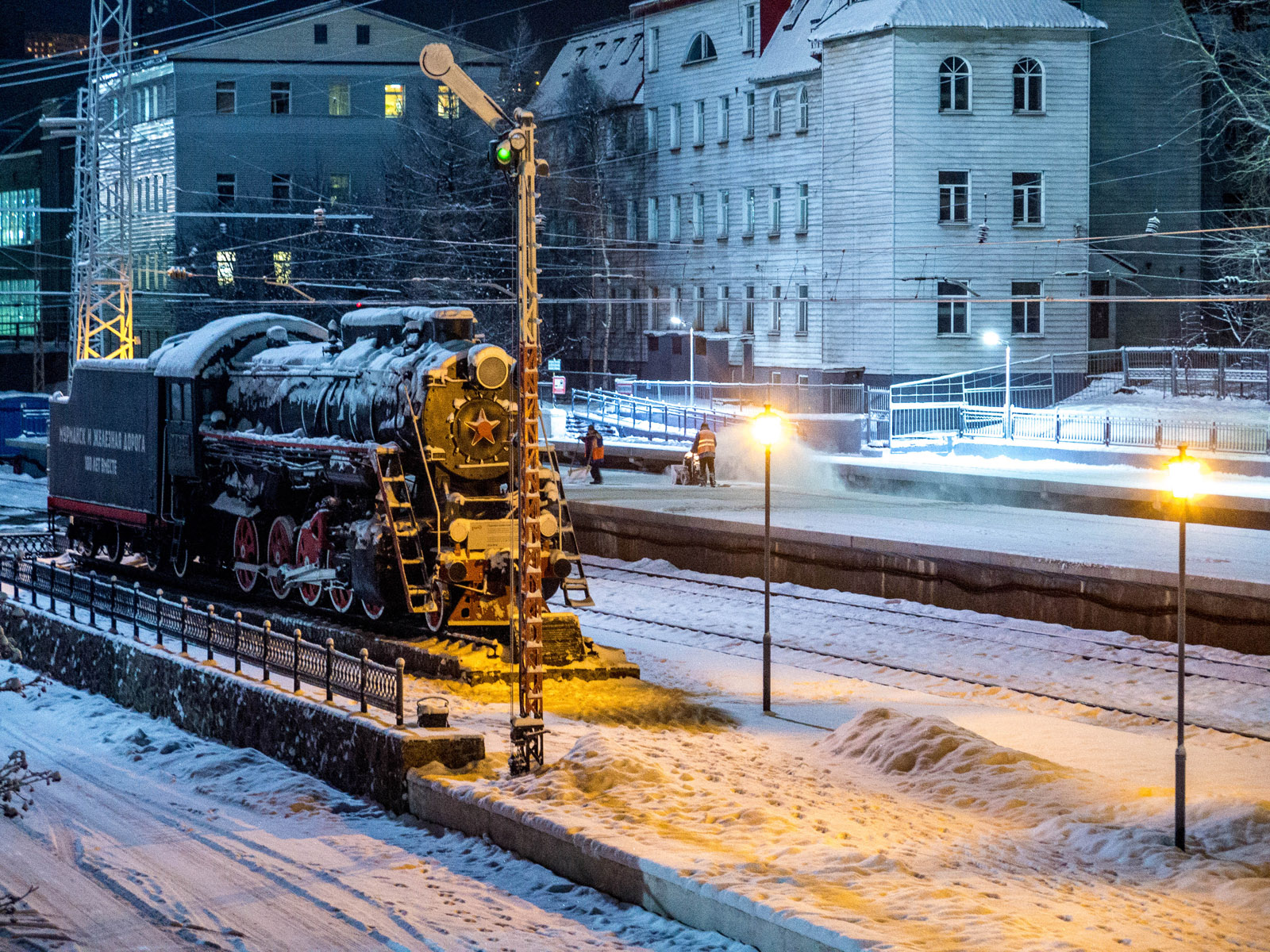
A train in Murmansk, Russia. All photos by Jo Turner.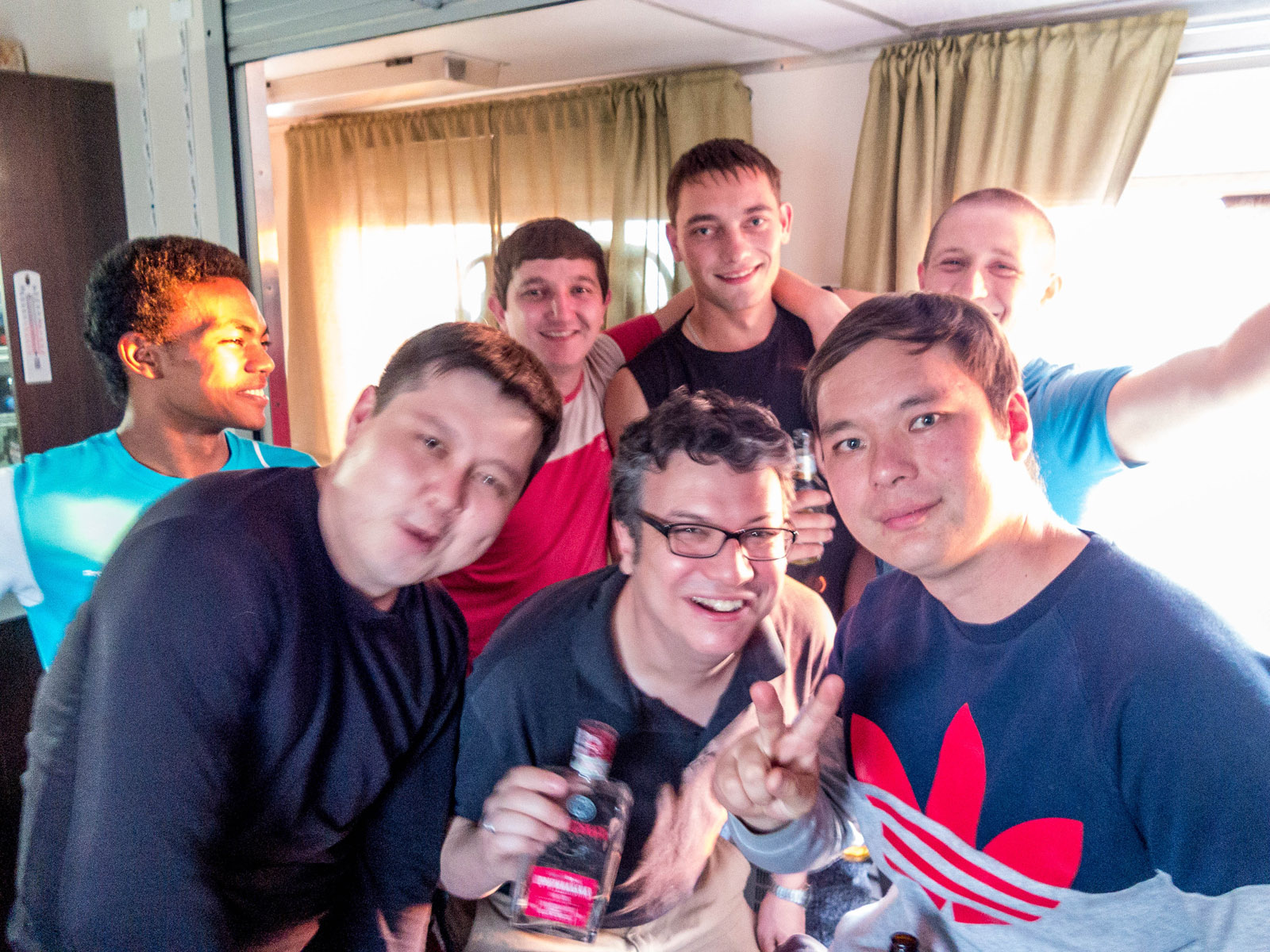 Drunken revelers (with the author at bottom center) aboard a train bound for Astana, Kazakhstan.
Drunken revelers (with the author at bottom center) aboard a train bound for Astana, Kazakhstan.
It wasn’t always thus. Russia experimented with Prohibition twice—once during World War I, and once during the late 80s. Both times, the governments were overthrown. Now, Russia is in another period of high alcohol regulation.
After passing the presidential baton from arch-soak Boris Yeltsin to superman of sobriety Vladimir Putin, the Russian state is trying to rein in its famous drunkenness. Beer was declared an alcoholic beverage in 2013, to the shock of no one except the Russians, who thought beer was alcohol like a cheeseburger is cheese—there’s just a little in there, so it doesn’t count, right?
Meanwhile, vodka—as well as other favourites like wine, cognac, and imported spirits—are facing a plethora of regulations, especially over where and when you can buy them. And one place you’re not to buy them, apparently, is on the Russian train.
But I didn’t know any of this. After my experience in Kazakhstan, I was excited for a truly sotty trip up the Russian heartland. All my friends who had previously taken the Trans-Siberian Railway had plied me with stories.
“We did drink,” says Russ Young, now a 34-year-old office manager in the UK, then a young ESL teacher in South Korea, making his way to Germany for FIFA World Cup 2006.
“Unfortunately, I got a little carried away on the vodka and fell out of my bunk, landing on the table beneath, which had glasses on it. Miraculously I was OK, even though the glasses were smashed.” He was informed that if he drank again, he’d be put off at the next station.
Photographer Martyn Thompson, also 34 and of the UK, remembers in 2008 a bar car full of vodka.
“Yes, we drank,” Thompson says. “There is very little else to do for the majority of the time, so we drank quite often. We met a guy who proceeded to order conical flask after conical flask of vodka to our table. He didn’t speak a lick of English and we didn’t speak any Russian, so we drew pictures on the napkins in a Pictionary-esque way of communicating.”
Thompson drew a classroom to signify he was a teacher. The man they were sitting with drew a gun and then pretended to point it at their heads.
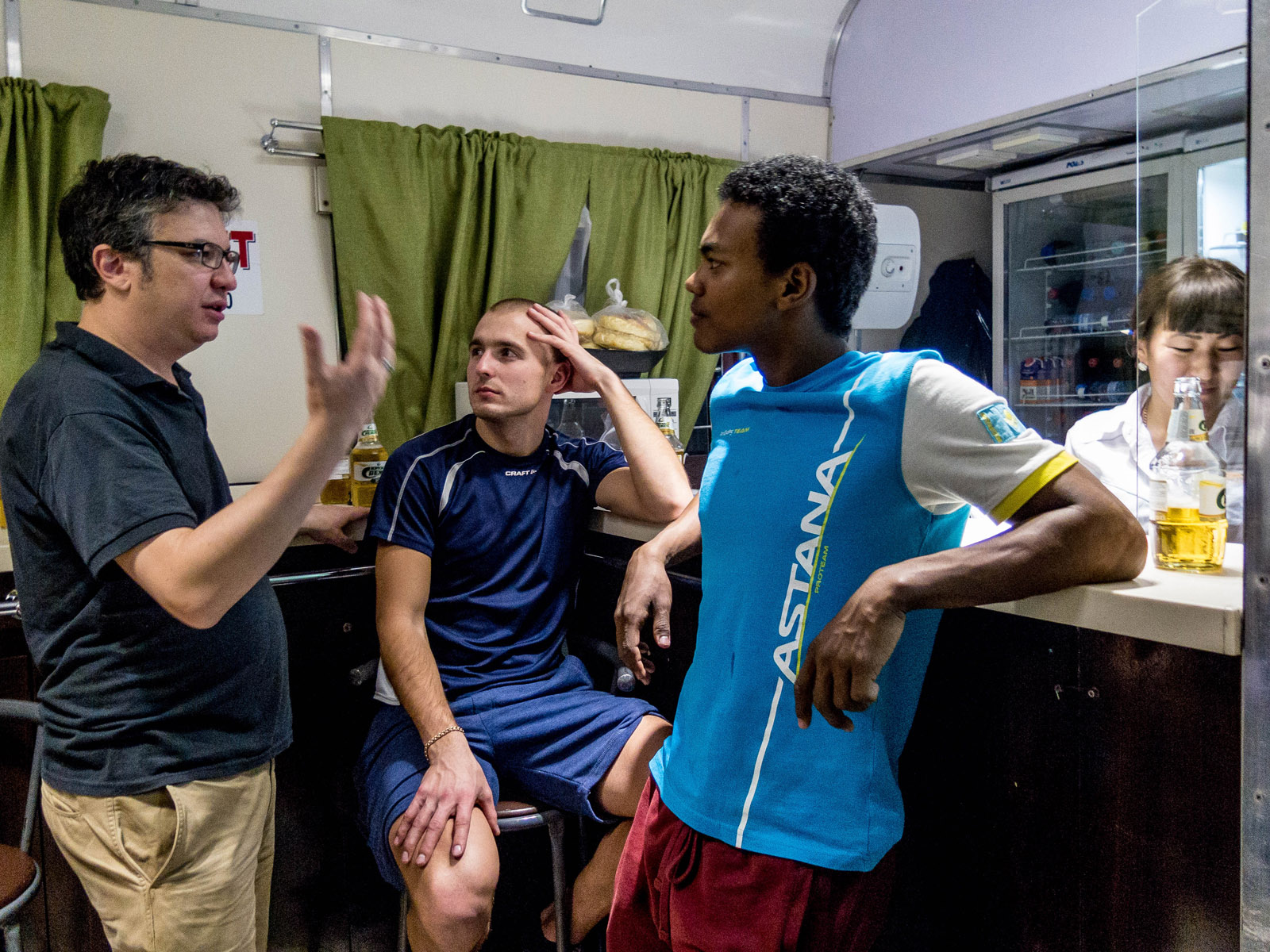
Boozing and chatting aboard the Astana train.
But today that is all finished. The restaurant car, if there is one, is now a sad reflection of what it once was. There is usually still beer and wine, but not always. If you’re lucky, you might find a worker who will supply you with some bootleg hooch. But don’t count on it.
Our first leg of the trip was from Astana, Kazakhstan, to Moscow, a 60-hour snowy slog, with only six hours of daylight per day and no entertainment except books and our laptops. For the first 24 hours the top two bunks in our cabin were empty, so we had plenty of privacy, but no one to direct us to the bar car, like in Kazakhstan.
I went to the provodnik, the dictator in charge of each car whom you’re expected to worship as a living god, and mimed eating and drinking, as in, “Where is the restaurant or bar car?” He just shook his head and said, “Nyet.”
What the fuck was this “nyet“? Sixty hours on a train and there is not only no bar car, but no restaurant car? I figured they would add one on once we crossed the border, and we had a bottle of wine and some instant noodles and chips to keep us until then.
But the next morning, once we were over the border, we were told again there was no bar or restaurant car. We could get off the train at some stops to pick up sausage, bread, and jars of nasty pickled mushrooms, but there was no beer or vodka being sold. We ate, we stewed, we drank tea, and we dreamed of cut glass bottles of booze.
Not a lot of cops tell crackheads they just need to finish up their crack before they can move along.
It was only when our new roommate arrived that we learned there was a way around it. He said nothing to us for the duration of the journey, but about 30 minutes in, I heard the distinctive pop and hiss of a beer can being opened. I came to life, turned to him, and reached up. “Where…” I mouthed to him.
He pointed to the provodnik’s cabin, so I ran there and asked, as best I could, “Beer? Beer? Beer?” Yes, he had beer. He hadn’t thought to mention this when I begged for a bar car earlier, but hidden under his seat were cases of beer, and I got a can each for me and the missus.
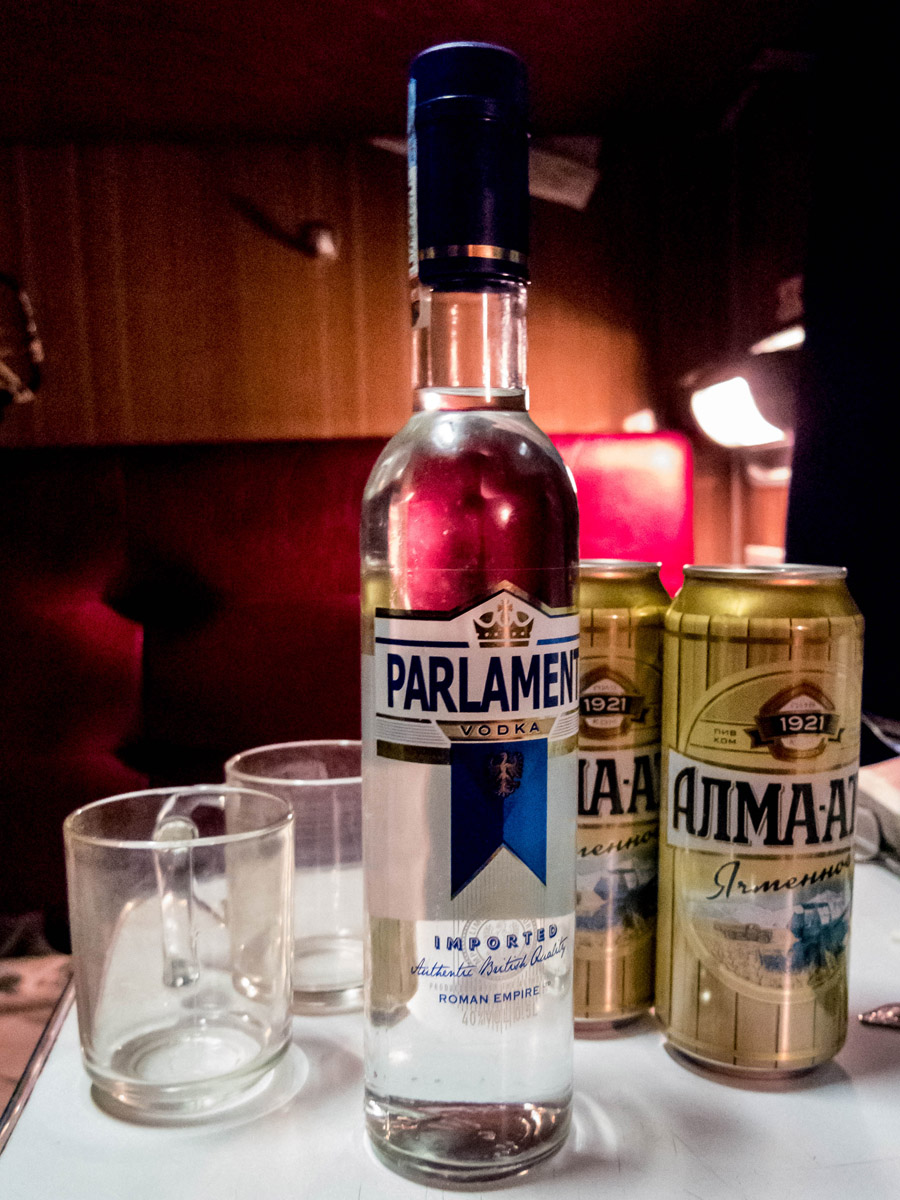
Parlament vodka.
Throughout the day, we went back and forth to the provodnik’s getting beer. I assumed this was all above board and legal—no one seemed to be hiding it. It turns out this was totally illegal, as we realized when the train police came through, saw my can of beer, and demanded I drink it up right away and throw it out. (Which was nice. Not a lot of cops tell crackheads they just need to finish up their crack before they can move along.)
We soon discovered that vodka and brandy (called “cognac” but certainly not from Cognac) can also be obtained, but this time it was even more surreptitious. I asked the provodnik in our carriage for vodka, but he just whispered “cognac” instead. I know what kind of hangovers an evening of brandy can cause, so I went to the next carriage, where the provodnista (female provodnik) handed me a 500-milliliter bottle of Parlament [sic] vodka, in a bunch of black plastic bags. It went down like a backroom drug deal.
Back in the cabin I drank the vodka, listening to Leonard Cohen’s Songs of Love and Hate, weeping for the poor man’s memory. After we had passed out, the provodnik snuck into our room and, after apologizing several times, climbed into the top bunk, opened a panel in the ceiling, pulled a bunch of bottles out, and then disappeared again. It might have been Coke. I have a feeling it wasn’t.
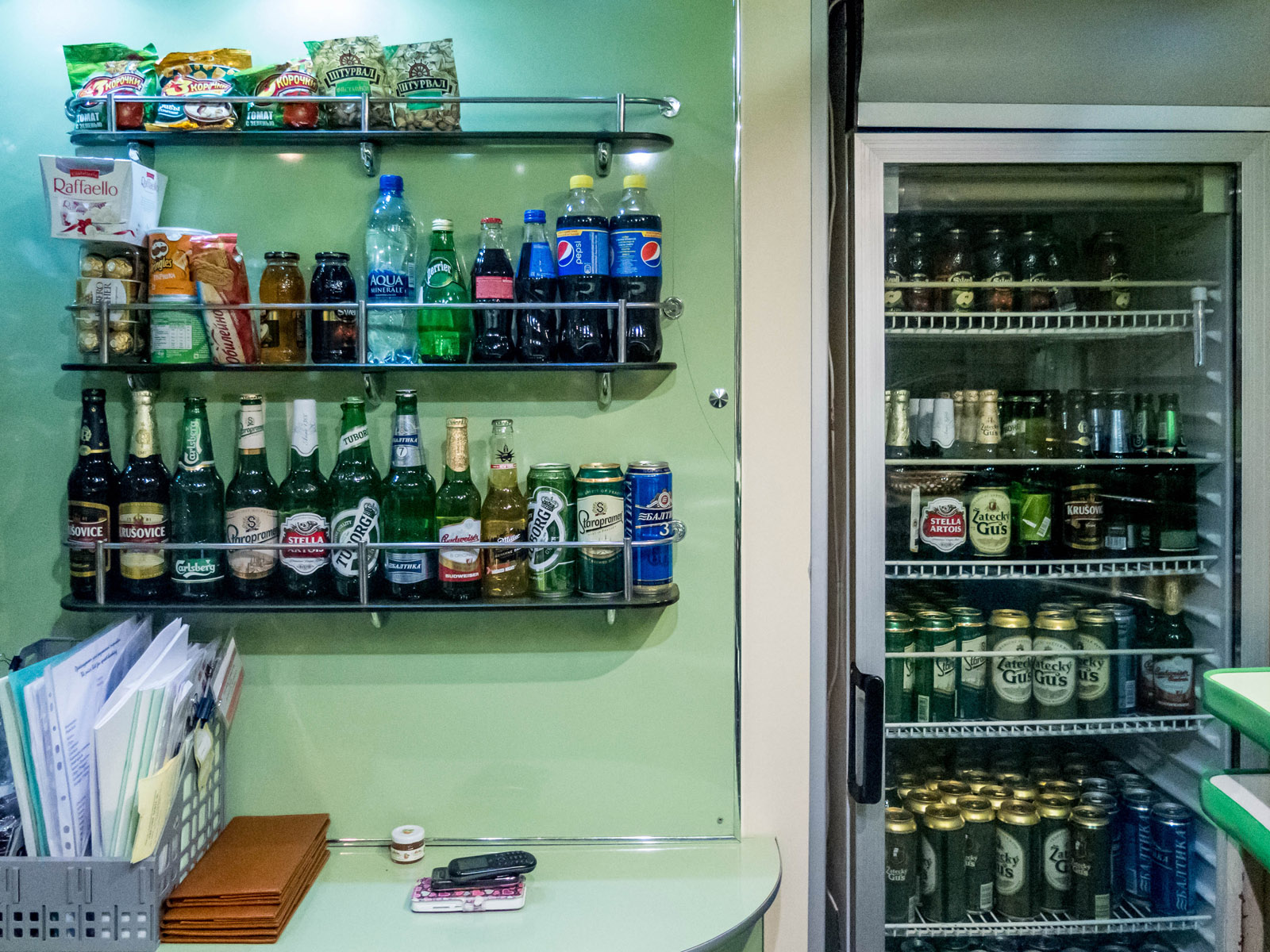
The booze options on the Murmansk train.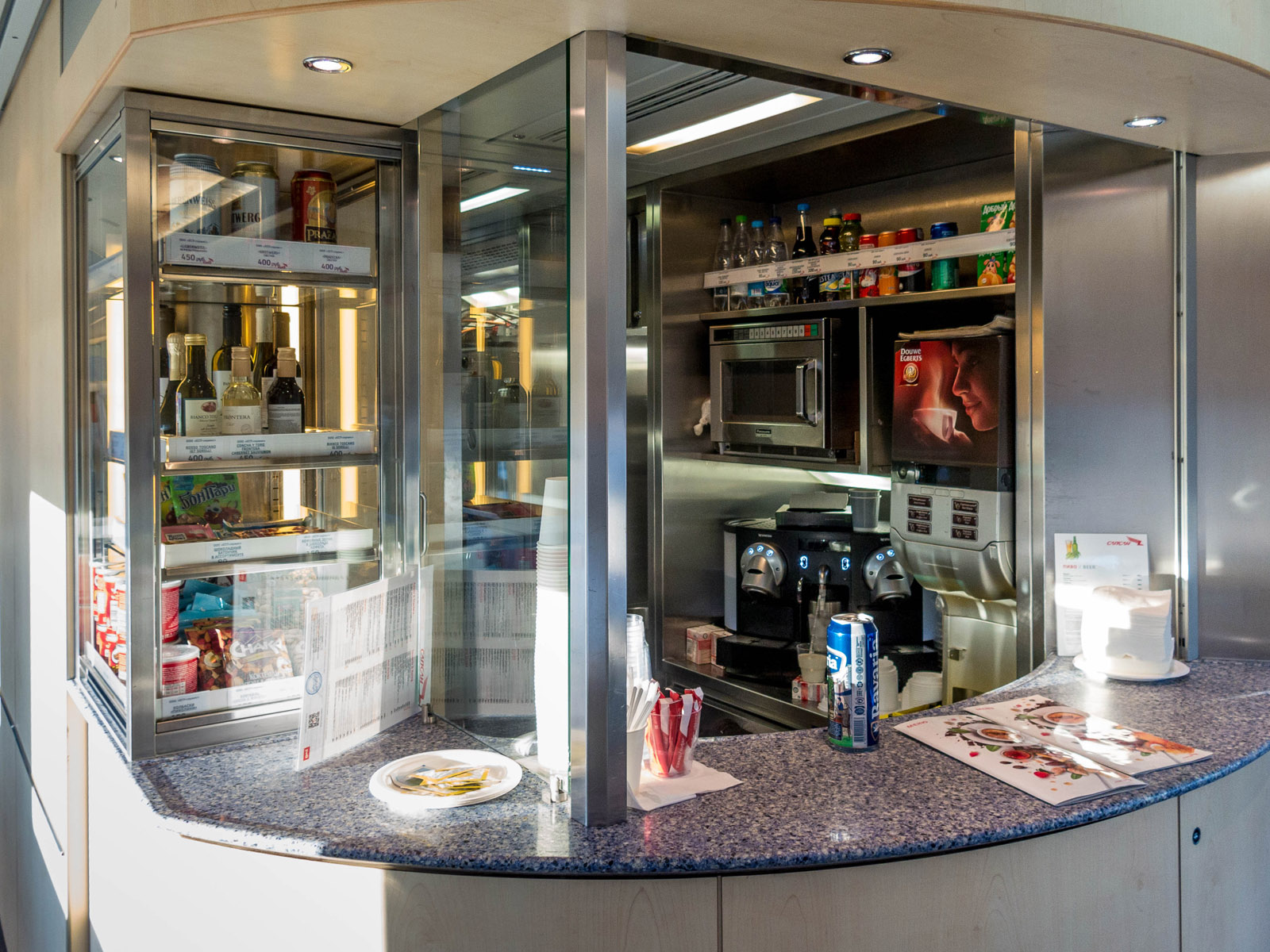 A St. Petersburg train’s bar car.
A St. Petersburg train’s bar car.
Sadly, there was to be no more train vodka, illicit or otherwise. On the high-speed Sapsan train from Moscow to St. Petersburg there was a bar car that served beer and wine. For whatever reason, all the most attractive young people employed by the Russian Rail Company are put to work on the Sapsans, including the two women who manned the drink car.
They had no vodka or cognac, but yes, there was beer and wine, and yes, I could bring it back to my seat. When I asked to take their pictures for the magazine, they gave me a look of pure disgust, the kind of look any hot, 20-year-old woman would reserve for a fat, middle-aged man who asks to take her picture, claiming it’s for a magazine she’s never heard of, but almost certainly being saved for the home computer spank bank. They hid behind the bar so I could take pictures of the cans of beer and bottles of wine. I did not return to the bar car for the rest of the trip.
On our final Russian train journey, the 26 hours from St. Petersburg to Murmansk, there was a restaurant car. We were in third class this time around; everyone piled together in bunks, with no walls or doors to hide booze behind.
It was appalling—not a single beer was cracked, never mind a bottle of spirits. Around dinnertime, my wife and I made our way to the restaurant car. It was largely deserted. There were two drunk dudes yelling at each other, who were soon cut off and thrown out. The very few patrons in the car drank beer, ate their meals, and behaved with decorum. I ordered beer for us, and then, playing the innocent tourist who knows no better, asked if she had vodka. The answer was a sharp, “Vodka, nyet!” We drank five beers each and then retired back to third class.
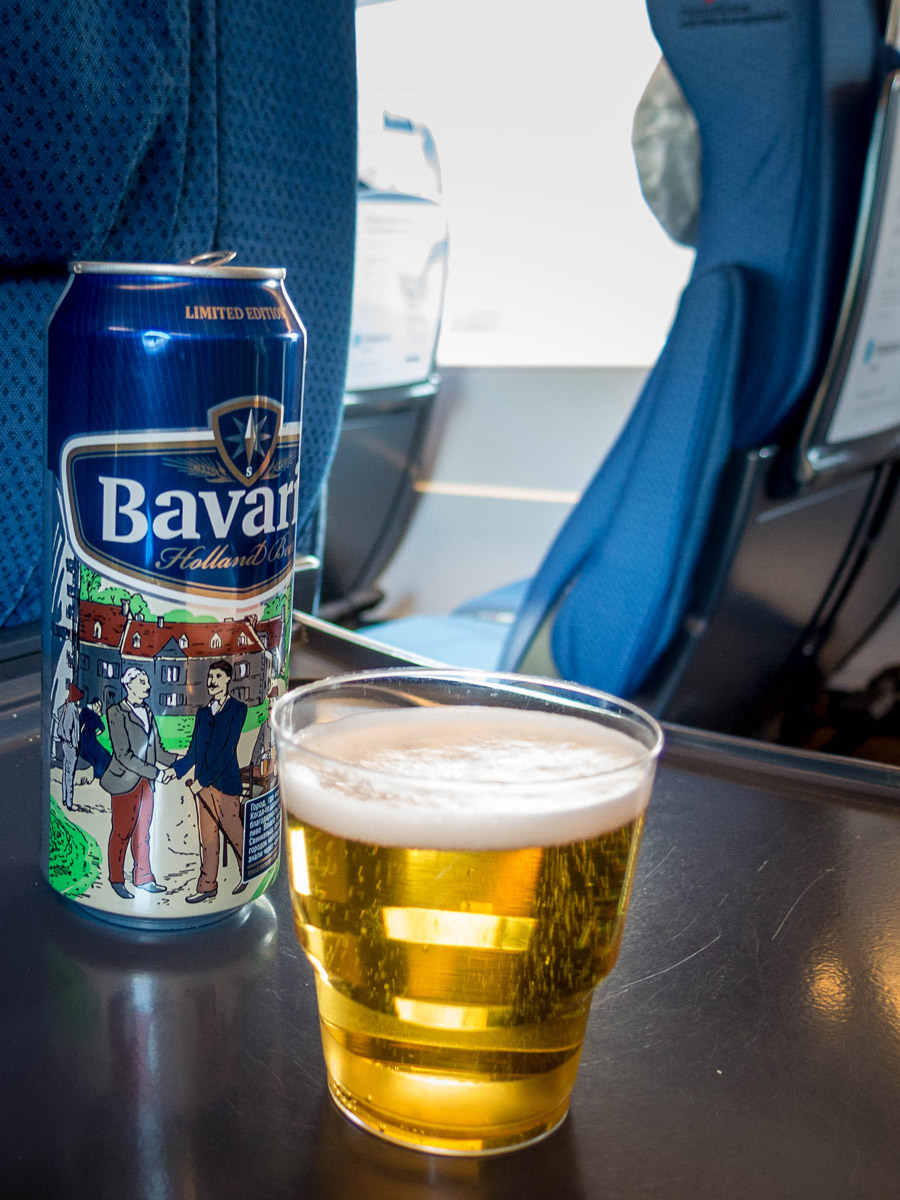
Drinking beer on a train from St. Petersburg.
I don’t know exactly when it was that Russia banned vodka on their trains. After repeated emails to Russian Railways’ press office, I only received one brief statement: “Thank you for the interest to our company. Please kindly be advised, that drinking alcohol on trains is an administrative offense in Russian law (rule 20.20 Code of the Russian Federation on Administrative Offenses) which is the area of responsibility of Ministry of Internal Affairs.”
The regulations date to at least 2001, but vodka was being sold in Russian restaurant cars at least as late as 2009. When my friend Sal McQuarrie, 40, took the train from Mongolia to Moscow in 2011, they were delivering it to the cabins wrapped in newspaper. McQuarrie says he has no idea if it was illegal or not, but that there was tons of it.
Sadly, it appears the glory days of the vodka-soaked train trip through Russia are over. Might as well fly—Aeroflot, I’m told, still serves booze.




